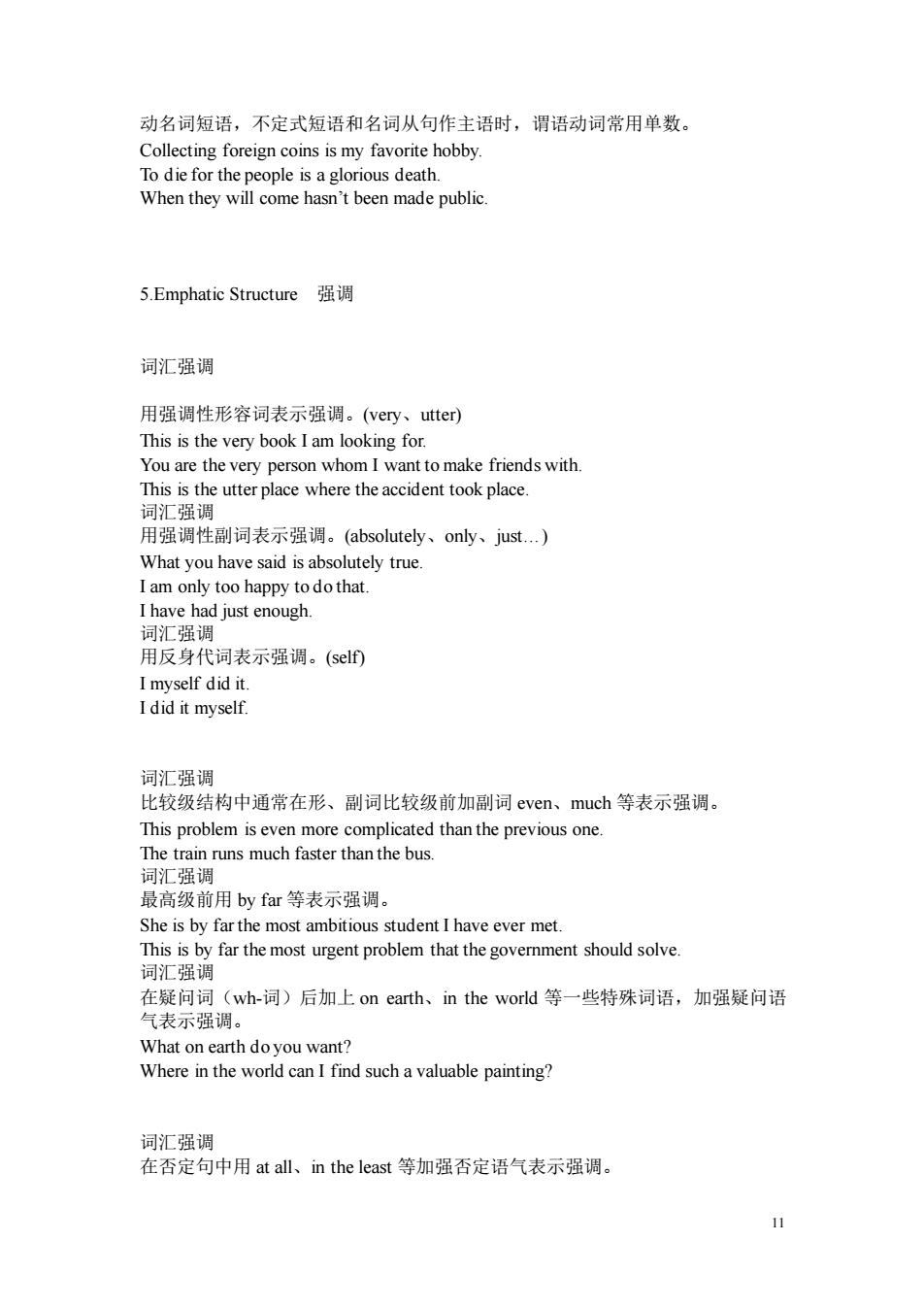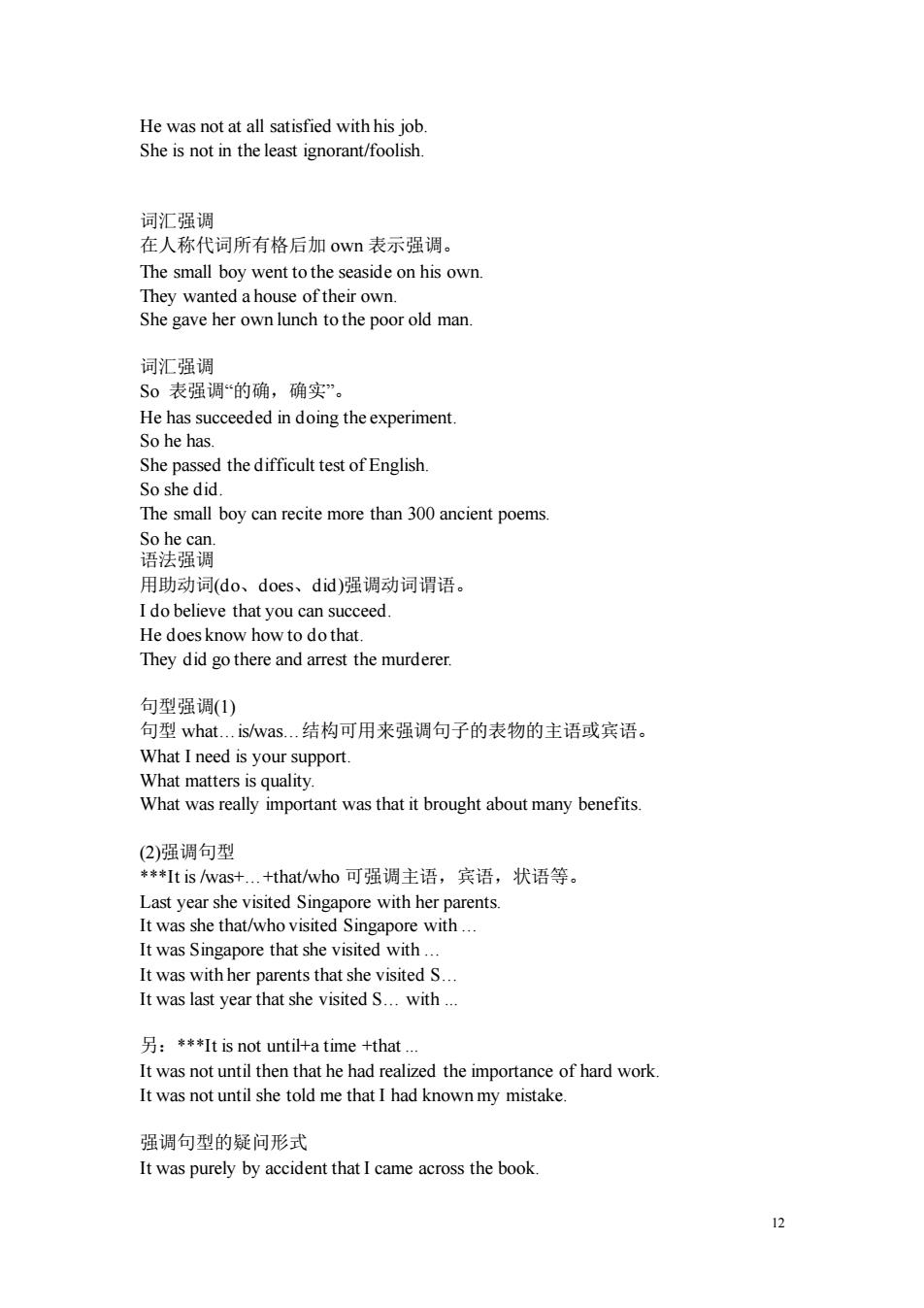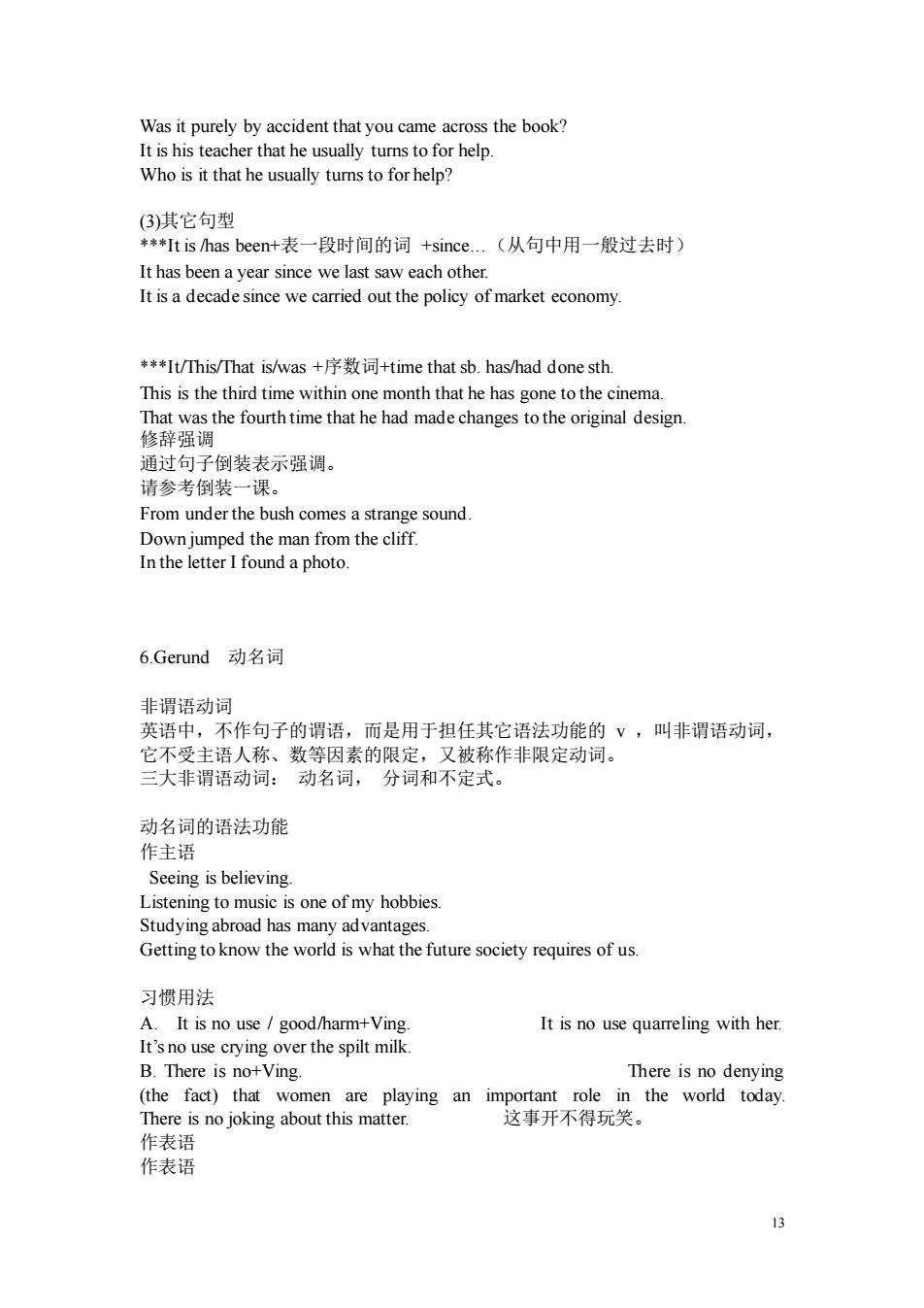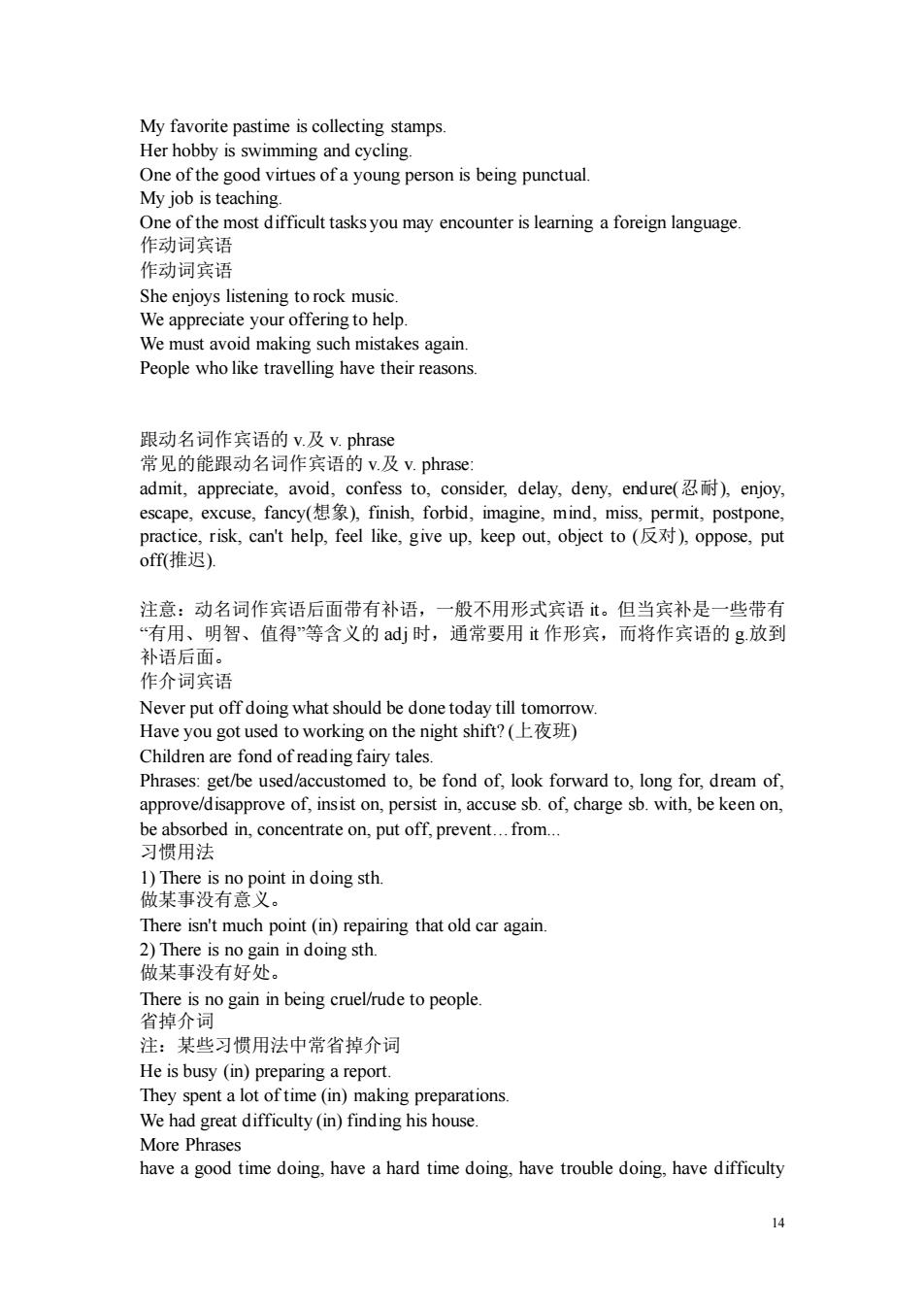
动名词短语,不定式短语和名词从句作主语时,谓语动词常用单数。Collecting foreign coins is my favorite hobbyTo die for the people is a glorious deathWhen they will come hasn't been made public5.EmphaticStructure强调词汇强调用强调性形容词表示强调。(very、utter)This is the very book I am looking for.You are the very person whom I want to make friends with.This is theutterplace wheretheaccident tookplace词汇强调用强调性副词表示强调。(absolutely、only、just...)What you have said is absolutely true.I am only too happy to do that.I have had just enough.词汇强调用反身代词表示强调。(self)I myself did it.I did it myself.词汇强调比较级结构中通常在形、副词比较级前加副词even、much等表示强调。This problem is even more complicated than theprevious one.Thetrainruns muchfasterthanthebus词汇强调最高级前用byfar等表示强调。She is by far the most ambitious student I have ever metThis is byfar themost urgent problem that the government should solve.词汇强调在疑问词(wh-词)后加上onearth、intheworld等一些特殊词语,加强疑问语气表示强调。What on earth do you want?Where in the world can I find such a valuable painting?词汇强调在否定句中用atall、intheleast等加强否定语气表示强调。11
11 动名词短语,不定式短语和名词从句作主语时,谓语动词常用单数。 Collecting foreign coins is my favorite hobby. To die for the people is a glorious death. When they will come hasn’t been made public. 5.Emphatic Structure 强调 词汇强调 用强调性形容词表示强调。(very、utter) This is the very book I am looking for. You are the very person whom I want to make friends with. This is the utter place where the accident took place. 词汇强调 用强调性副词表示强调。(absolutely、only、just.) What you have said is absolutely true. I am only too happy to do that. I have had just enough. 词汇强调 用反身代词表示强调。(self) I myself did it. I did it myself. 词汇强调 比较级结构中通常在形、副词比较级前加副词 even、much 等表示强调。 This problem is even more complicated than the previous one. The train runs much faster than the bus. 词汇强调 最高级前用 by far 等表示强调。 She is by far the most ambitious student I have ever met. This is by far the most urgent problem that the government should solve. 词汇强调 在疑问词(wh-词)后加上 on earth、in the world 等一些特殊词语,加强疑问语 气表示强调。 What on earth do you want? Where in the world can I find such a valuable painting? 词汇强调 在否定句中用 at all、in the least 等加强否定语气表示强调

He was not at all satisfied with his job.She is not in the least ignorant/foolish.词汇强调在人称代词所有格后加own表示强调。The small boy went to the seaside on his own.They wanted a house oftheir own.She gave her own lunch to the poor old man词汇强调So表强调“的确,确实”。He has succeeded in doing the experimentSo he has.She passed the difficult test of EnglishSo she did.The small boy can recite more than 300 ancient poems.So he can.语法强调用助动词(do、does、did)强调动词谓语。I do believe that you can succeed.Hedoesknowhowtodothat.They did gothere and arrest the murderer句型强调(1)句型what...is/was...结构可用来强调句子的表物的主语或宾语。What I need is your supportWhat matters is quality.What was really important was that it brought about many benefits.(2)强调句型***Itis/was+...+that/who可强调主语,宾语,状语等。Last year she visited Singapore with her parents.It was she that/who visited Singapore with ..It was Singaporethat she visited with...It was with her parents that she visited s...It was last year that she visited S... with ...另:***It is not until+a time +that...Itwas not until thenthat hehad realizedtheimportanceof hard workItwasnotuntil shetoldmethatI hadknownmymistake强调句型的疑问形式It was purely by accident that I came across the book12
12 He was not at all satisfied with his job. She is not in the least ignorant/foolish. 词汇强调 在人称代词所有格后加 own 表示强调。 The small boy went to the seaside on his own. They wanted a house of their own. She gave her own lunch to the poor old man. 词汇强调 So 表强调“的确,确实”。 He has succeeded in doing the experiment. So he has. She passed the difficult test of English. So she did. The small boy can recite more than 300 ancient poems. So he can. 语法强调 用助动词(do、does、did)强调动词谓语。 I do believe that you can succeed. He does know how to do that. They did go there and arrest the murderer. 句型强调(1) 句型 what.is/was.结构可用来强调句子的表物的主语或宾语。 What I need is your support. What matters is quality. What was really important was that it brought about many benefits. (2)强调句型 ***It is /was+.+that/who 可强调主语,宾语,状语等。 Last year she visited Singapore with her parents. It was she that/who visited Singapore with . It was Singapore that she visited with . It was with her parents that she visited S. It was last year that she visited S. with . 另:***It is not until+a time +that . It was not until then that he had realized the importance of hard work. It was not until she told me that I had known my mistake. 强调句型的疑问形式 It was purely by accident that I came across the book

Was it purely by accident that you came across the book?It is his teacher that he usually turns to for help.Who is itthatheusuallyturnstoforhelp?(3)其它句型***Itis/hasbeen+表一段时间的词+since..(从句中用一般过去时)Ithasbeena year sincewelast saweachotherIt is a decade since we carried out the policy of market economy.***It/This/That is/was+序数词+timethat sb.has/had donesthThis is the third time within one month that he has gone to the cinema.That was the fourth time that he had made changes to the original design修辞强调通过句子倒装表示强调。请参考倒装一课。From under the bush comes a strange soundDown jumped the man from the cliff.In the letter I found a photo6.Gerund动名词非谓语动词英语中,不作句子的谓语,而是用于担任其它语法功能的V,叫非谓语动词,它不受主语人称、数等因素的限定,又被称作非限定动词。三大非谓语动词:动名词,分词和不定式。动名词的语法功能作主语Seeing is believingListeningtomusicisoneofmyhobbiesStudyingabroadhasmanyadvantages.Getting to know the world is what the future society requires of us.习惯用法A.It is no use /good/harm+VingIt is no use quarreling with her.It's no use crying over the spilt milk.There is no denyingB. There is no+Ving(the fact) that women are playing an important role in the world todayThere is no joking about this matter.这事开不得玩笑。作表语作表语13
13 Was it purely by accident that you came across the book? It is his teacher that he usually turns to for help. Who is it that he usually turns to for help? (3)其它句型 ***It is /has been+表一段时间的词 +since.(从句中用一般过去时) It has been a year since we last saw each other. It is a decade since we carried out the policy of market economy. ***It/This/That is/was +序数词+time that sb. has/had done sth. This is the third time within one month that he has gone to the cinema. That was the fourth time that he had made changes to the original design. 修辞强调 通过句子倒装表示强调。 请参考倒装一课。 From under the bush comes a strange sound. Down jumped the man from the cliff. In the letter I found a photo. 6.Gerund 动名词 非谓语动词 英语中,不作句子的谓语,而是用于担任其它语法功能的 v ,叫非谓语动词, 它不受主语人称、数等因素的限定,又被称作非限定动词。 三大非谓语动词: 动名词, 分词和不定式。 动名词的语法功能 作主语 Seeing is believing. Listening to music is one of my hobbies. Studying abroad has many advantages. Getting to know the world is what the future society requires of us. 习惯用法 A. It is no use / good/harm+Ving. It is no use quarreling with her. It’s no use crying over the spilt milk. B. There is no+Ving. There is no denying (the fact) that women are playing an important role in the world today. There is no joking about this matter. 这事开不得玩笑。 作表语 作表语

My favorite pastime is collecting stampsHer hobby is swimming and cyclingOne of thegood virtues ofa young person is being punctual.My job is teaching.One ofthemostdifficult tasksyoumay encounter is learning aforeign language作动词宾语作动词宾语She enjoys listening to rock music.We appreciate your offering to help.We must avoid making such mistakes againPeople who like travelling have their reasons.跟动名词作宾语的v.及v.phrase常见的能跟动名词作宾语的v.及v.phraseadmit,appreciate,avoid,confess to,consider,delay,deny,endure(忍耐),enjoyescape, excuse,fancy(想象),finish, forbid, imagine, mind, miss,permit, postponepractice, risk, can't help, feel like, give up, keep out, object to (反对), oppose, putoff(推迟)注意:动名词作宾语后面带有补语,一般不用形式宾语it。但当宾补是一些带有“有用、明智、值得"等含义的adj时,通常要用it作形宾,而将作宾语的g.放到补语后面。作介词宾语Never put off doing what should be done today till tomorrowHave you got used to working on the night shift?(上夜班)Children are fond of reading fairy tales.Phrases: get/be used/accustomed to, be fond of, look forward to, long for, dream of,approve/disapprove of, insist on, persist in, accuse sb.of, charge sb.with, bekeen on,be absorbed in, concentrate on, put off,prevent...from...习惯用法1) There is no point in doing sth做某事没有意义。There isn't much point (in) repairing that old car again.2) There is no gain in doing sth.做某事没有好处。There is no gain in being cruel/rude to people省掉介词注:某些习惯用法中常省掉介词He is busy (in) preparing a report.They spent a lot of time (in) making preparationsWe had great difficulty (in) find ing his houseMorePhraseshave a good time doing, have a hard time doing, have trouble doing, have difficulty14
14 My favorite pastime is collecting stamps. Her hobby is swimming and cycling. One of the good virtues of a young person is being punctual. My job is teaching. One of the most difficult tasks you may encounter is learning a foreign language. 作动词宾语 作动词宾语 She enjoys listening to rock music. We appreciate your offering to help. We must avoid making such mistakes again. People who like travelling have their reasons. 跟动名词作宾语的 v.及 v. phrase 常见的能跟动名词作宾语的 v.及 v. phrase: admit, appreciate, avoid, confess to, consider, delay, deny, endure(忍耐), enjoy, escape, excuse, fancy(想象), finish, forbid, imagine, mind, miss, permit, postpone, practice, risk, can't help, feel like, give up, keep out, object to (反对), oppose, put off(推迟). 注意:动名词作宾语后面带有补语,一般不用形式宾语 it。但当宾补是一些带有 “有用、明智、值得”等含义的 adj 时,通常要用 it 作形宾,而将作宾语的 g.放到 补语后面。 作介词宾语 Never put off doing what should be done today till tomorrow. Have you got used to working on the night shift? (上夜班) Children are fond of reading fairy tales. Phrases: get/be used/accustomed to, be fond of, look forward to, long for, dream of, approve/disapprove of, insist on, persist in, accuse sb. of, charge sb. with, be keen on, be absorbed in, concentrate on, put off, prevent.from. 习惯用法 1) There is no point in doing sth. 做某事没有意义。 There isn't much point (in) repairing that old car again. 2) There is no gain in doing sth. 做某事没有好处。 There is no gain in being cruel/rude to people. 省掉介词 注:某些习惯用法中常省掉介词 He is busy (in) preparing a report. They spent a lot of time (in) making preparations. We had great difficulty (in) finding his house. More Phrases have a good time doing, have a hard time doing, have trouble doing, have difficulty